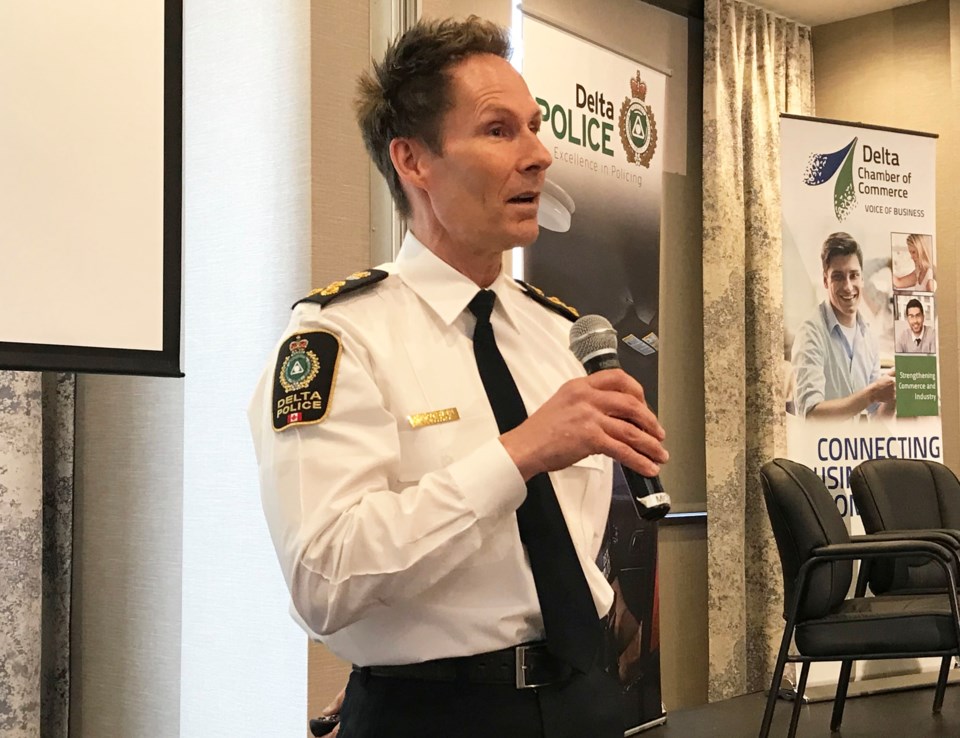It’s going to be legal in the coming months despite many unanswered questions.
Police chief Neil Dubord and special guests at the Delta Chamber of Commerce’s luncheon meeting Tuesday outlined the plethora of uncertainties facing police and employers as recreational marijuana is set to be legalized later this summer.
Saying he won’t state a position one way or the other whether he agrees with legalization, Dubord explained what will be allowed, including being able to be in possession of up to 30 grams and being able to cultivate up to four plants at home.
As far as medical pot, people can bring that to work as long as they have prescriptions.
Those who use medical cannabis are even able to use it while on the job, as long as they don’t reach impairment, but it will be difficult without training for supervisors, especially in occupations that come with risk such as truck drivers or forklift operators, to identify if someone is stoned, warned Dubord. That also will be the case when someone comes to work stoned having used recreational marijuana. Firm policies, training and education, especially for prevention, will be extremely important, Dubord advised.
“This is a big concern for anyone who has employees in a risk sensitive safety position,” he said.
The same difficulty faces police officers pulling over drivers suspected of being impaired on pot because there’s currently no test devices such as the ones used on drunk drivers. Drivers suspected of being stoned would have to take a form of field sobriety test and, if there’s enough probable cause, a subsequent blood test. However, there’s no hard numbers like alcohol to declare a person is impaired on pot. Marijuana can be absorbed at different rates and affect individuals differently, making it all the more challenging for police, while leaving results open for interpretation by defense lawyers.
Dubord pointed out what’s been happening in Colorado where pot is legal and there’s now 424 marijuana stores. Fatal motor vehicle accidents there are up 88 per cent while workplace injuries are up around nine per cent, Dubord noted.
Monitoring home grows, meanwhile, will also be extremely difficult. A Tsawwassen home on Fourth Avenue that had plants for medical purposes was the victim of a so-called grow-rip. In North Delta, police raided a home that had permission to grow around 60 plants but was found to have 500, but all police could do was take away the extra plants.
“We disagree that there should be home grows. We think that there are many, many facilities that do a very professional job that can make the supply of marijuana available for everyone…When our officers go into any house in Delta as a result of a call for service and we see five plants, are we expected to take action on that?” he asked.
Matt Houghton, CEO of GroupHEALTH Benefit Solutions, discussed the uncertainties when it comes to medical marijuana and employee benefit plans, including whether employers will be able to ascertain whether what’s prescribed by health practitioners is reasonable for a condition. Various plans are already placing caps on the amount of money that can be used by employees for medical pot to prevent claims and premiums skyrocketing.
He also noted there’s been a “staggering” increase in the number of people with medical marijuana cards from September 2016, when there was 98,500, to September of last year when there was over 235,000 card holders. Plans attempting to not cover medical marijuana could face human rights complaints, he added.
Delta police superintendent Harj Sidhu during the question-and answer session reiterated some of the uncertainties including the challenges policing grow ops. Neither he nor anyone else at the meeting were clear if employers can require employees to be tested for pot, even if there’s a workplace accident.



